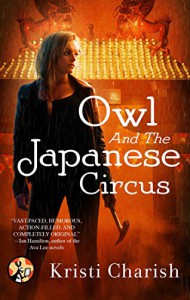

“I have a strict policy. No magic, no monsters, no supernatural clients. Ever.”
So says Owl, ex-archaeologist and thief extraordinaire. Still trying to avoid the vampires that she managed to rile in a previous escapade, Owl is in no mood for a new job. However, she soon discovers that it’s really, really hard to say no to a dragon. It isn’t long before Owl is trying to navigate the tricky waters of supernatural politics while avoiding vampires, angry nagas, and a confusing romantic relationship. Without the help of her friends and allies, she’s all set to crash and burn.
I have such mixed feelings about this book. On the one hand, I loved the Indiana-Jones-With-Extra-Magic-On-The-Side vibe. I loved Owl’s vampire-killing cat, Captain. I loved Owl’s snarky, quip-filled narration:
“You know your sanity is in question when you find yourself in a two-way conversation with a cat.”
Charish put together a fun world, an entertaining story, and an intriguing villain, and I absolutely adored the ending--specifically, the last sentence of the book.
But certain aspects just drove me nuts. Like trying to enjoy a concert while the guy behind you is whistling “This is the song that never ends,” I found it really, really hard to concentrate on the fun parts.
First, I can’t buy the worldbuilding. The basic idea is that even though the clues of magic are everywhere, the world hasn’t caught on because the International Archaeology Association (IAA) has carefully hidden the truth from the world. How, you might ask? Well, apparently they’re a paramilitary organization with spies and influence everywhere and the ability to reach any archaeological crime scene before the police. Why are they hiding the truth from the world? Well, apparently No One Can Handle the Truth-- well, no-one other than the IAA, and the site guards who are trained to deal with the monsters, and the people funding the IAA, and the universities that the IAA is “strangling”, and the archaeology students, the antiquity experts, and whoever else is needed to provide logistics of all of that.
I don’t know about you, but in my experience, any secret kept by more than two or three people leaks pretty darned fast. Masquerade worlds usually function via society’s unwillingness to accept the strange, but in this case, (a) there’s actual hard archaeological evidence of the weirdness, and (b) somehow there’s a vast organisation whose entire purpose is hiding magic, which leaves me with (c) absolutely no idea why anyone would bother, other than plot convenience. Not even the conspiracy itself is consistent; for example, the postdoc Owl worked with“had been falsifying data to hide a supernatural mummy from our supervisor,” who must have been as well aware of it all as the archaeologists themselves.
The other thing that drove me up the wall was Owl herself. Where to begin? As one might expect of an archaeology thief, Owl is not a good person. However, she combines duplicitous bitchery with an absolutely staggering measure of self-righteousness.
Let’s start with her backstory, which Owl seems unable to keep straight. Owl sold her principles for a promise of funding and a cushy post, but since she was too stupid to get any guarantees, the university promptly reneged on its promises. For most of the book, Owl keeps harping on and on about how she left because“My conscience had gotten me thrown out of the university.”Uh, no. She sold her integrity--twice, by my count--and felt betrayed when she discovered it wasn’t as valuable as she had thought.
So much for her honesty. Let’s consider her good nature. When Owl helps out a fellow grad student in desperate straits, she not only feels entitled to some quid pro quo and when he refuses her request, she starts threatening him. When Owl is double-crossed by one of her victims, she feels hurt and betrayed, whining that
“Funny how when people’s lives are in ruins, they’re more than happy to associate with the likes of me. It’s after I fix everything that they suddenly recall I’m treacherous, unconscionable me. [...] No good deed goes unpunished.”
That’s not precisely accurate. They remember she’s a treacherous, vindictive creep when she starts blackmailing them and/or setting up her little revenge schemes.
(show spoiler)
Now let’s consider her skills. Throughout the book, there’s an assumption that Owl’s talents make her irreplaceable, but I’m not entirely sure what those talents actually are. Owl’s “train wreck” logistics, her tendency to mouth off to everyone she meets, and her inability to “plan her way out of a lit and unlocked chest” become a running gag throughout the book. According to one of her friends,
“You can’t help but do stupid things. It’s in your nature. It’s also what makes you the best at what you do.”
Which makes me think that her valuable skill must actually be for fucking up. Admittedly, she’s absolutely spectacular at that, as well as roping in others to take her knocks for her.
(show spoiler)
The book showed so much promise. I loved the writing style. I loved the ideas. I'm well aware that the issue is just me Taking It Too Seriously. I really, really regret that I couldn’t enjoy it to the full. I can still heartily recommend it to anyone of a more forgiving and tolerant disposition.
**Note: this review is of an uncorrected advanced reader copy. While the included quotes may not reflect the final phrasing, I believe they speak to the nature of the novel as a whole.**
~~I received this ebook through Netgalley from the publisher, Gallery, Threshold, Pocket Books, in exchange for my honest review.

 17
17




